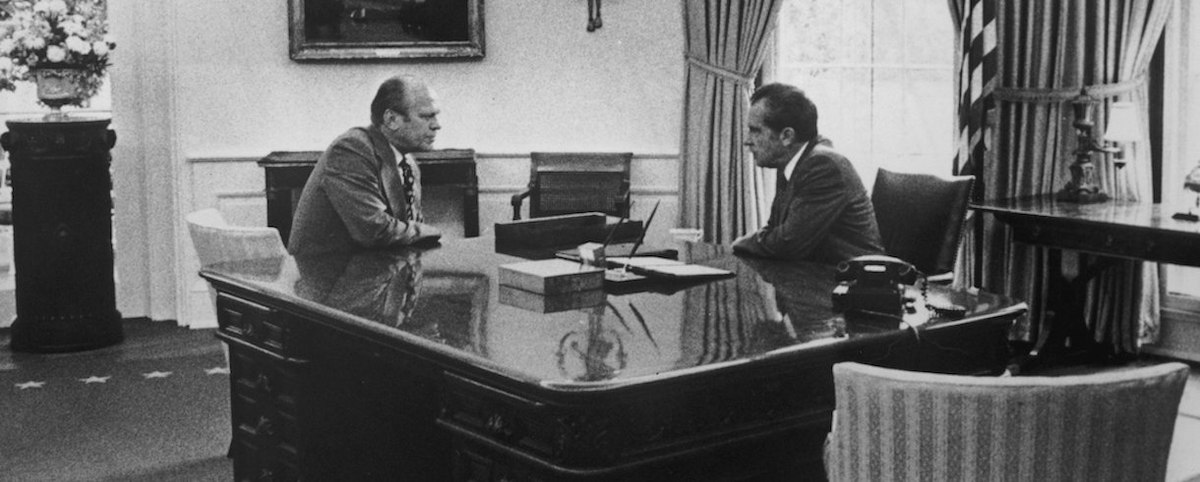As the 50th anniversary of Gerald Ford’s controversial pardon of Richard Nixon approaches, new polling reveals that public support for the pardon has increased over time, though slightly more still disapprove of it than approve. Americans are divided over many specific pardons, largely corresponding to whether their party and the party of the president who issued it are aligned. While some of the most recent pardons — such as those granted by President Joe Biden for marijuana possession — receive broad approval, others, particularly those issued by former President Donald Trump to his allies, are viewed far less favorably.
Roughly half of Americans approve of presidents having the power to pardon federal crimes, but majorities think it would be inappropriate for presidents to pardon themselves, family members, or donors. Many support putting limits on the president's pardon power, including by making public the reasons behind pardons, prohibiting self-pardons, and limiting pardons during an election year.
Which specific pardons do Americans approve and disapprove of?
When Ford issued a pardon to Nixon for crimes related to the Watergate scandal roughly 50 years ago, Americans disapproved of it by 59% to 26%, according to a national survey by Opinion Research Corporation conducted at the time. Today, views are somewhat less negative: 40% of Americans strongly or somewhat disapprove of that decision and 35% approve. Opinion is also split on Jimmy Carter's pardon of G. Gordon Liddy, who was sentenced to prison for his role in the Watergate scandal: 27% approve of his pardon and 24% disapprove.
The two most popular pardons included in the survey among 18 total are by President Joe Biden: of people convicted of marijuana possession (69% approve) and of former service members convicted of crimes related to their gender or sexual orientation (55%). The pardoning of draft resisters from the Vietnam War by Presidents Ford and Carter is also popular: 54% of Americans approve of it.
Pardons granted to other specific people receive less support, and large shares say they are unsure about them. More disapprove than approve of pardons by Donald Trump, including of Paul Manafort, Charles Kushner, Scooter Libby, Roger Stone, Joe Arpaio, and Dinesh D'Souza.
More Republicans than Democrats approve of pardons which poll questions indicated were being granted by Republican presidents. The opposite is generally true for pardons granted by Democratic presidents, with two exceptions. Republicans are more likely than Democrats to support Carter's pardons of Liddy and of Confederate president Jefferson Davis.
More Americans say Trump (46%) than Biden (23%) used the pardon power inappropriately, according to questions asking about each president's use of the pardon, in general.
Looking ahead to how the next president will handle the pardon power, more expect Trump (50%) would use it inappropriately if elected than expect Democratic nominee Kamala Harris would (31%).
What Americans know about the limits of presidential pardon power
Most Americans (70%) are aware that presidents can pardon people convicted of federal crimes. But fewer than half are aware that they can pardon their family members (48%), people convicted of a crime involving the president (43%), or crimes in the military (42%). Just 25% are aware that presidents can issue preemptive pardons, meaning before formal charges are brought.
Significant shares of Americans incorrectly think presidents have the power to pardon people convicted of state crimes (41%), people impeached by Congress (31%), and people who have committed crimes abroad (23%).
About one in four Americans (26%) think that presidents have the power to pardon themselves, while 38% think they do not. Whether they can pardon themselves remains a constitutional gray area, as the issue has never been adjudicated.
What Americans think about presidential pardon power
By 51% to 34%, Americans approve of presidents having the power to pardon or commute prison sentences of people convicted of federal crimes. More Republicans (61%) than Democrats (44%) and Independents (49%) approve of giving presidents the power to pardon.
Compared to six years ago — during Trump's presidency — Republicans are now 7 percentage points less likely to approve of the pardon power, during a Democrat's presidency. Democrats, on the other hand, are now 5 points more likely to approve of it.
Americans disagree on how often presidents should use the pardon power: 24% say they generally give out too many pardons, 15% say too few, and 25% say the right amount. Democrats and Republicans have similar views on the question.
Most people think it would be inappropriate for a president to pardon themself (77%), and a similar share say the same about a president pardoning a family member (74%). Majorities disapprove of presidential pardons for a president's donors (68%), members of their administration (57%), and corporations (57%).
Americans are closely divided on a pardon by a current president of a former one: 34% say it's appropriate and 40% say it's inappropriate.
More say it is appropriate (56%) than inappropriate (27%) for presidents to pardon government whistleblowers.
Majorities of Democrats oppose all types of pardons asked about, with the exception of ones for government whistleblowers. Smaller majorities of Republicans say it's inappropriate for a president to pardon themself, their family members, and their donors. Republicans are divided on whether pardons are appropriate for members of a president's administration and corporations; more support than oppose pardons for previous presidents.
Reforming the pardon power
78% of Americans strongly or somewhat support making public the reasons behind presidential pardons, and more than half are in favor of prohibiting a president from pardoning themself (65%), as well as limiting the types of federal crimes for which a president can grant a pardon (60%).
More support than oppose prohibiting presidential pardons during a presidential election year (43%) and after a new president-elect has won an election (40%). Slightly fewer support (36%) than oppose (41%) giving Congress the power to reverse a presidential pardon.
More Democrats than Republicans favor proposals prohibiting a president from pardoning themself (82% vs. 43%), giving Congress the power to reverse a presidential pardon (42% vs. 25%), and prohibiting presidential pardons after a new president-elect has won an election (46% vs. 32%).
Related:
- What Americans think about crime and Kamala Harris' approach to it
- Americans are divided on whether a president can pardon himself
- Most Americans approve of Biden's pardons of federal convictions for marijuana possession
- No support for a Manafort pardon
— Carl Bialik contributed to this article
See the results for this YouGov poll
Methodology: This poll was conducted online on August 15 - 19, 2024 among 1,130 U.S. adult citizens. Respondents were selected from YouGov’s opt-in panel to be representative of adult U.S. citizens. The sample was weighted according to gender, age, race, education, 2020 election turnout and presidential vote, baseline party identification, and current voter registration status. Demographic weighting targets come from the 2019 American Community Survey. Baseline party identification is the respondent’s most recent answer given prior to November 1, 2022, and is weighted to the estimated distribution at that time (33% Democratic, 31% Republican). The margin of error for the overall sample is approximately 4%.
Image: Getty
What do you think about the election, American politics in general, and everything else? Have your say, join the YouGov panel, and get paid to share your thoughts. Sign up here.













